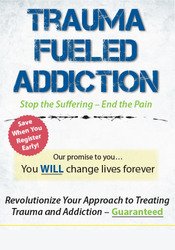

We watch the pain that trauma inflicts on peoples life every day, we witness the spiral and the deepening of the pain that for years has gone untreated, we watch people struggle and ultimately grasp for anything within their control to ease the pain. Yet, with everything they do to ease the pain, the hole only deepens.
Their world and the world of their loved ones continues to grow darker and darker and darker every day of their life. As behavioral health professionals, digging people out of this hole is not simply something we do; rather it is our responsibility to do it effectively.
This breakthrough seminar will advance your clinical skills and competencies and give you proven and practical tools and techniques for your everyday clinical practice. Learn powerful trauma-focused interventions to help people reduce emotional pain and suffering and begin the healing journey of reclaiming their lives in recovery.
Join trauma and addictions expert, LaChelle Barnett, LCSW, LCAC, for this transformational seminar to learn about this cutting-edge new integrated approach to treating trauma and addiction. You will take home a wealth of evidence-based, best-practice clinical interventions and techniques including motivational and skills building strategies for helping trauma survivors who self-medicate with alcohol or drugs. Learn the latest advances in trauma treatment including the top interventions from CBT, seeking safety, body-based therapies and integrated approaches for women.
This evidence-based seminar will help you become a more trauma-competent therapist giving you the latest tools and techniques you need to treat trauma and addiction in your existing practice. The seminar will feature the latest research updates, live demonstrations, handouts, resources, interactive discussions, case examples and live role plays demonstrating key interventions and techniques.
| File type | File name | Number of pages | |
|---|---|---|---|
| Manual ZNM052315 (0.82 MB) | 49 Pages | Available after Purchase | |
| Manual ZNM052315 Updated (43.50 MB) | 67 Pages | Available after Purchase |
LaChelle Barnett, LCSW, LCAC, is the CEO of a nonprofit in South Bend, IN. She is a psychotherapist at Oaklawn Psychiatric Center, specializing in working with clients who have both trauma and addiction issues. She is a professor at Indiana University teaching groups classes to undergraduate students. In addition, she works as a consultant speaking at various conferences and events on various clinical issues.
She earned her masters degree in social work from Indiana University and a Bachelor of Arts degree majoring in Sociology from the University of Dayton, additionally she is a licensed clinical social worker (LCSW) and licensed clinical addictions counselor (LCAC). She is currently pursuing her doctorate degree.
LaChelle has been trained in multiple treatment modalities including Eye Desensitization Reprocessing (EMDR), Moral Recognition Therapy (MRT), Emotionally Focused Therapy (EFT), Cognitive Behavioral Therapy (CBT) and Motivational Interviewing (MI). In addition, she is trained in Batters Intervention Program (BIP). She has years of experience working with mental health patients in the areas of both trauma and addiction.
Speaker Disclosures:
Understanding Trauma and Addiction
Relevant Trauma and Addiction Research
Identify Key Elements of Trauma and Treatment
Make it Safer to Remember
Therapeutic Relationship – How to Achieve Breakthroughs
Learn Effective Top Trauma Treatment Techniques
Interventions and Techniques for the Toughest Clients
Effective Outpatient Addiction Strategies
Integrated Treatments – Special Considerations for Women
Special Take Away Tools Section – Your Training Continues
Please wait ...